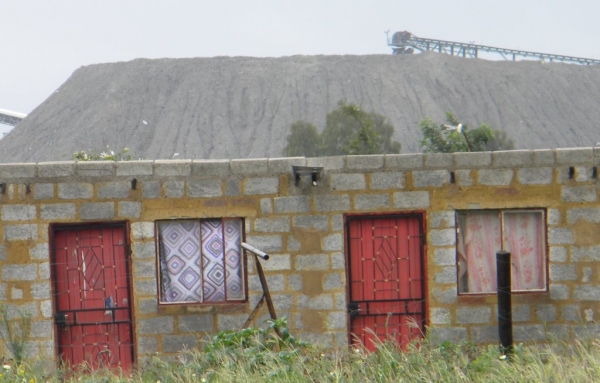

Marikana, North West Province. Photo by Nathan Geffen.
21 May 2015
Mining companies and the government are ignoring the interests of the communities that should be benefiting from mining, writes the author. Now civil society organisations intend to take legal action.
The Chamber of Mines (CoM) at its recent AGM was adamant that the “mining industry has done more for transformation than any other component of the private sector since the advent of democracy”. This bold assertion was in response to claims by the Department of Mineral Resources (DMR), which suggests that among other failures of the industry to meet its own commitments made in the Mining Charter, that only 36% of the industry has met the targets of community development.
The claim by the CoM does not reflect the lived reality of communities affected by mining.
While both the Minister of Mineral Resources and the CoM are supposedly divided on the truth of their respective claims, they are united in their exclusion of the people they supposedly care so much about.
The truth of the matter is that the bluster emanating from these quarters is designed primarily to further the narrow interests of mining companies and the select and chosen few who are tapped by the ruling party as preferred beneficiaries of BEE deals, and not the communities affected by mining.
The Mineral Petroleum Resources Development Act (MPRDA), first introduced in 2002, was intended as a new dispensation giving equitable access to the country’s mining and petroleum resources. The act states that its purpose is to “give effect to section 24 of the Constitution by ensuring that the nation’s mineral and petroleum resources are developed in an orderly and ecologically sustainable manner while promoting justifiable social and economic development”.
However, the act requires mining companies only to consult with the community and report back on the outcome of those consultations to the DMR before a mining right is issued by the minister. The permission of the community is not required. The DMR and the minister have no obligation to consult with the community affected and usually do not do so; they depend on the report given to them by the mining company, which the community has no right to see and which is often in dispute.
Mining Affected Communities United in Action (MACUA), a national organisation representing over 70 organisations, has attempted to engage with both the Minister and the CoM with regards to creating a more inclusive and beneficial environment in the industry, but have been met with closed doors and refusals.
Despite this arrogance from the Minister and the CoM, mining affected communities and civil society have recently — in recognition and celebration of the constitution — gathered to declare their demands for a just and equitable mining industry.
Over 60 community representatives from all nine provinces of South Africa and 20 civil society formations gathered to consider their continued exclusion from the mining laws. The meeting noted that the MPRDA failed to deal with any of the long-standing problems with the previous legislation, including:
• the inability of the public to access vital information about mining;
• the further exclusion of communities from claiming their rights to Free Prior and Informed Consent;
• the widespread disregard for environmental laws and rehabilitation obligations;
• the abject failure of “social and labour plans” to make many meaningful improvement in the lives of mining communities; and
• the inappropriateness of making the DMR the authority that oversees environmental compliance by the mining industry.
All of these representations were ignored by Parliament, and the Bill was rushed through the National Council of Provinces with unseemly haste in what appears to have been a deliberate attempt to prevent public participation.
It should be noted in this context of exclusion, that the current Mining Charter does not contain community consent or input and that the dispute about community development is one which is fundamentally oppressive in its continued exclusion and dismissal of the right of communities to have a say in what development takes place and how that development should be distributed.
The DMR and the Chamber have a constitutional and statutory obligation to respect, protect, promote and fulfil the rights of mine-Affected communities to equality, dignity, property, access to adequate housing, food and water, and an environment not harmful to health and well-being. The DMR and its exclusive agreements with the Chamber have, through a number of acts and omissions caused discrimination against mining affected communities.
Communities, through MACUA and the Civil Society Coalition on the MPRDA are preparing to take government to the Equality Court to make this point. We have also indicated to the Minister that we intend to participate in any court application on the merits of the Mining Charter and its exclusion of communities. It is no surprise to us then that the Minister has not sort clarity from the courts, as this would potentially expose the unconstitutional racket imposed on the industry and society by the DMR and the Chamber.
While the Minister and the Chamber continue to strike deals behind closed doors, the anger and resentment of communities continue to build. Just last week another protester was shot and killed in Atok as mining companies and government struggle to contain the demands of communities. The solution lies not in grand claims but in honest inclusive engagements with the real stakeholders.
Rutledge is the Mining and Extractives Coordinator in South Africa for ActionAid International. Views in this article are not necessarily GroundUp’s.